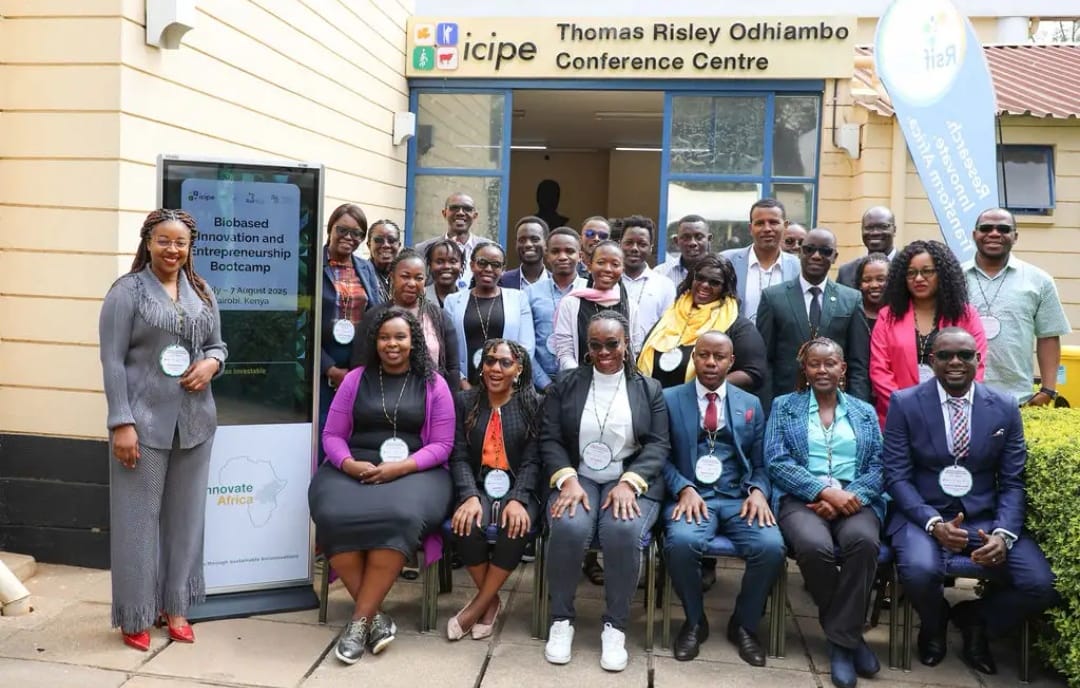By Correspondent
Twenty scientists from 10 African countries wrapped up an intensive 10-day Biobased Innovation and Entrepreneurship Bootcamp (BIEB) at the International Centre of Insect Physiology and Ecology (icipe) headquarters in Nairobi, Kenya, with a pitching event on Thursday, August 8, that showcased groundbreaking ideas aimed at addressing societal challenges and fostering a sustainable bioeconomy in Africa.
Organised by BioInnovate Africa in partnership with the Regional Scholarship and Innovation Fund (RSIF), the bootcamp is designed to transform promising biobased research into investable ventures. Through practical workshops, co-creation sessions, and exposure to commercial bio-based industries, participants refined ideas ranging from biopesticides and biomaterials to wastewater treatment technologies, food and nutrition innovations, and biopharmaceuticals.
Dr. Julius Ecuru, Head of BioInnovate Africa and Principal Scientist at icipe, described the programme as a platform for turning science into enterprise.
“What really happened in this bootcamp is that scientists with innovative ideas came together and worked hard to make those ideas investable,” Dr. Ecuru said. “We encourage scientists to look beyond public sector jobs and consider private sector pathways. Our goal is to link science and research with industry, enabling scientists to become job creators and transformative industry players.”
Participants were competitively selected from the BioInnovate Africa network of universities and research organisations, with five scholars drawn from RSIF. They represented Burundi, Chad, the Democratic Republic of Congo, Ethiopia, Ghana, Kenya, Malawi, Rwanda, Tanzania, and Uganda – with all East African countries represented.
The bootcamp also exposed participants to the triple helix model of innovation – linking academia, industry, and policy – through site visits and networking. Collaborations with partners such as the East African Community Secretariat, the Nelson Mandela African Institution of Science and Technology, A-to-Z Group, and Envsol Technology Limited provided insights into scaling innovations beyond national borders.
For Mercy Mmarri, a food and nutrition scientist from Tanzania’s Sokoine University of Agriculture, the experience was transformative.
“As scientists, we’re used to working in the lab. This bootcamp pushed us to speak the language of customers and investors,” she said. “We went to the field, tested our products with real people, and refined our ideas based on feedback. The exposure to industry and policy players was eye-opening.”
Mmarri, who pitched a plant-based burger innovation, credited RSIF and BioInnovate for supporting her journey from indigenous knowledge research to market-ready product development.
“The skills and networks I’ve gained here will help me pitch to more investors, whether or not I’m among the selected five,” she said.
According to Dr. Ecuru, final selections of the projects to advance will be made later this year following further proposal reviews. Beyond the immediate outcomes, he stressed that the bootcamp’s ultimate aim is to cultivate scientist-entrepreneurs who can create jobs and drive Africa’s bioeconomy.
“We encourage scientists not only to look at public sector employment but also to see opportunities in the private sector. They can be transformative industry players, solving regional and global challenges,” he noted.
